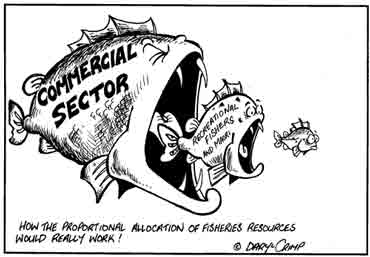| Quota System not working for New Zealanders
by
Grant Dixon
18 September 2009
Grasping at international reports that give us a ‘green’ rating seems to appeal to our Kiwi psyche that craves a pat on the head.
It is however interesting that the authors of Rebuilding Global Fisheries remain silent while the Minister of Fisheries, Ministry officials and the fishing industry have been quick to extol the virtues of our quota management system.
 If this report is proof that our quota system is working then the wrong yardstick is being used.
If this report is proof that our quota system is working then the wrong yardstick is being used.
New Zealand’s fisheries management system has been graded alongside Alaska’s, as being better than 29 other jurisdictions examined.
However, after 23 years there has been no objective analysis of the quota system itself and whether it is delivering on its sustainability foundation or the much-promised best practice.
Any train still on the tracks looks good when compared to a wreck. Perhaps, if some of New Zealand’s train-wreck fisheries were included in the report, the claims being made would be a little more realistic.
Precautionary management required
Exploitation of natural resources that belong to every New Zealander requires precautionary management and success measured in environmental, social and cultural terms, in addition to the commercial gains.
Unfortunately, sustainability has been used in fisheries to justify the wholesale slaughter of fish for export while Kiwis miss out on a healthy meal.
Prior to the quota system’s introduction in 1986 some of our fish stocks were reduced in mass by over 80 and sometimes 90 percent. A number of these fisheries are still teetering on a precarious edge.
Such has been the decline in abundance that thousands of ordinary folk can neither afford to buy fish from a retailer nor catch enough to feed their children. This is becoming a serious concern for our national health and well-being.
Perpetual overfishing is not only risking the future health of our people it is threatening both the environment and abundance of inshore fisheries.
The quota management system was an economic experiment spawned by privatisation zealots, motivated by creating wealth for a few individuals and corporates. These monopolies now wield their power at will, threatening litigation at every opportunity.
Plundered fisheries
Undeniably the quota system has warded off total collapse in many fisheries. What remains largely unseen is that some fisheries have not recovered to even the minimum sustainability levels required by the Fisheries Act.
Orange roughy and hoki are two well-known examples of fish stocks plundered to the point of closure or having severe catch limits imposed.
In the early 1980s the North Island west coast snapper stock had plummeted to an estimated five percent of its original size. Mass exploitation by local and overseas vessels had removed over 95 percent of the original stock!
After 23 years of quota management this important food fishery has moved from five percent of its original size to around ten percent, but still hovers around half the stock level specified by the Act.
Deceit by spin merchants trumpets the doubling in size of this fishery. The truth is the fishery was decimated to just five percent. Ten percent is still precarious.
The chilling reality is that traditional inshore and land-based snapper fishing on the west coast has become a hit-and-miss exercise as people, hungry for a feed, are denied access to fish of acceptable size or numbers. That is because less biomass generally means the stock contracts and often the remaining fish are further offshore.
The effects of overfishing are not only borne by people fishing for food they also have a major impact on the fisheries, even if those consequences are mostly unseen.
Productivity lost
Millions of fish have been taken and deemed under the quota system. The deeming regime is meant to be a deterrent to overfishing but often it is worth more commercially to land the excess fish, pay the penalties charged by the Ministry and reap the rewards when that fish is on-sold.
There are serious concerns for the future productivity of both our marine environment and the stock as these fish are dragged from the water, their progeny never to seen, while the Ministry pockets the money and ignores the wider consequences of overfishing.
This depletion is compounded by a system that does not meaningfully account for all the young fish that are killed by the deployment of bulk-harvesting fishing methods, or the unwanted by-catch that is dumped or minced as fishmeal. All attention is focused on the weight of fish landed at the wharf.
It is no wonder there is increasing concern amongst non-commercial interests about “sustainable management”, excessive catch limits and the environment.
This is especially so when we consider the numerous fisheries that have a commercial catch limit set so high that it has never been reached in over 20 years, or those fisheries where no allowance is made for the public’s environmental, social or cultural interest.
It is morally unacceptable that the average citizen is paying the price for a reluctant Ministry and commercial greed.
The ongoing, divisive attitude of fisheries managers has just added to the alienation of all New Zealanders from their fisheries.
We need to acknowledge the limitations of market forces and the quota management system when considering how we enable exploitation of publicly owned, natural resources.
It is all very well having supportive international reports and legislation that specifies sustainability levels, but it is another to manage our fisheries to ensure there is abundance for the future and sufficient for people’s current needs.
Any train still on the tracks looks good when compared to a wreck.
TOP |





